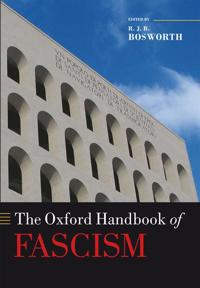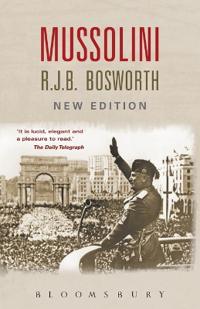Mussolini's Italy: Life Under the Fascist Dictatorship, 1915-1945 (Häftad)
avR. J. B. Bosworth
ISBN: 9780143038566 - UTGIVEN: 200702An evaluation of Italy's notorious Fascist period under dictator Benito Mussolini considers its violence and demands for obedience, noting how it served as a model for other twentieth-century dictatorships while arguing that the nation's largely undeveloped country and tribal family structures helpe[...]
The Oxford Handbook of Fascism (Häftad)
avR. J. B. Bosworth
ISBN: 9780199594788 - UTGIVEN: 201010The essays in this Handbook, written by an international team of distinguished scholars, combine to explore the way in which fascism is understood by contemporary scholarship, as well as pointing to areas of continuing dispute and discussion. From a focus on Italy as, chronologically at least, the '[...]
Italian Venice (Inbunden)
avR. J. B. Bosworth
ISBN: 9780300193879 - UTGIVEN: 2014-08In this elegant book Richard Bosworth explores Venice - not the glorious Venice of the Venetian Republic, but from the fall of the Republic in 1797 and the Risorgimento up through the present day. Bosworth looks at the glamour and squalour of the belle epoque and the dark underbelly of modernization[...]
Mussolini (Häftad)
avR. J. B. Bosworth
ISBN: 9780340981733 - UTGIVEN: 201005In 1945, disguised in German greatcoat and helmet, Mussolini attempted to escape from the advancing Allied armies. Unfortunately for him, the convoy of which he was part was stopped by partisans and his features, made so familiar by Fascist propaganda, gave him away. Within 24 hours he was executed [...]
Explaining Auschwitz And Hiroshima (Pocket)
avR. J. B. Bosworth
ISBN: 9780415109239 - UTGIVEN: 1994-04-28Explores the way in which the main combatant societies of the Second World War have historicised that experience. Bosworth argues that the traumatic history of the war has remained crucial to the politics of post-war societies.[...]
Nationalism (Häftad)
avR. J. B. Bosworth
ISBN: 9780582506022 - UTGIVEN: 200704Why do many of us swell with pride at the sound of the national anthem or sight of the national flag? Why do we use our nationalities to describe who we are? Why do politicians claim to stand for 'national values' above all else? In his new critical study of nationalism, R.J.B. Bosworth explores [...]








